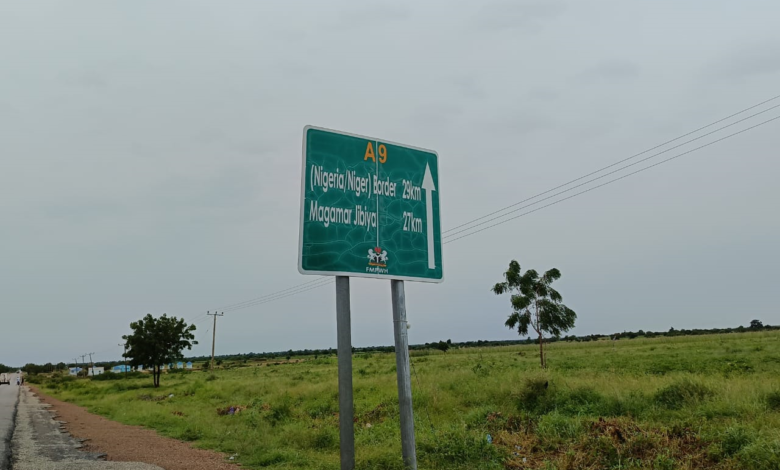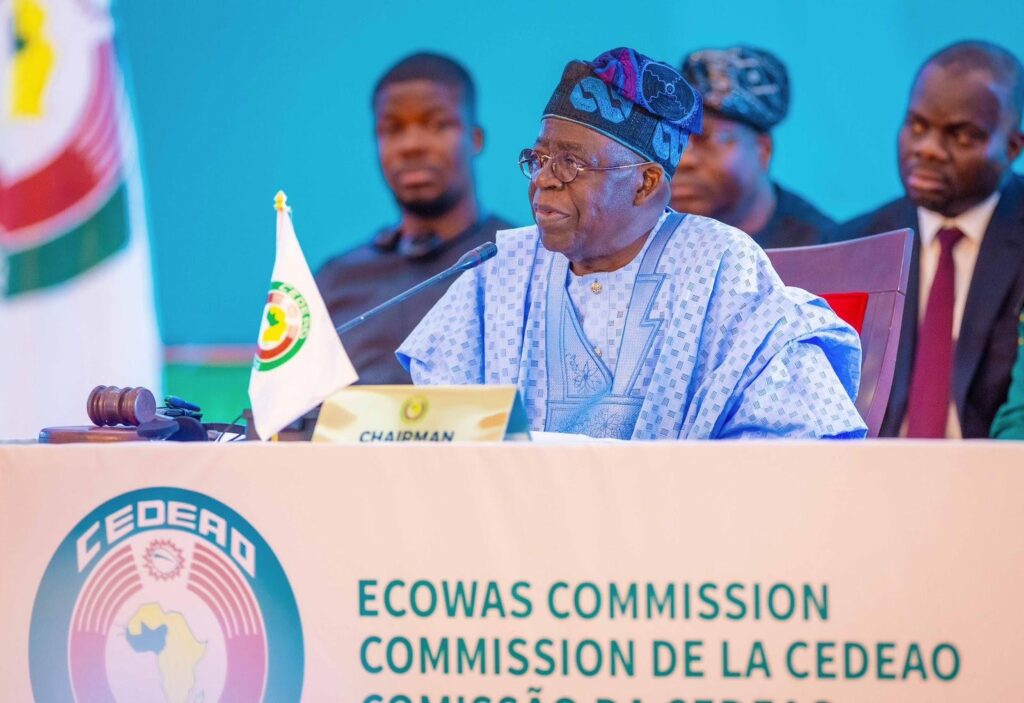With 8000 CFA Bribe, Nigerian Smugglers Are Bypassing ECOWAS’ Border Crackdown In Niger
The Economic Community of West African States (ECOWAS) imposed a transborder crackdown in the Niger Republic after military officials failed to restore democracy in the fragile country. However, local smugglers are working in cahoots with border guards in Niger to get around the sanctions.

Jibya, a bustling town bordering the Niger Republic in Nigeria’s Katsina State is silent; rows of cargo trucks wait quietly to cross over.
The townspeople feign compliance with the crackdown by the Economic Community of West African States (ECOWAS) over the recent coup in Niger. But they place their goods in the hands of local smugglers, who arrange the next legs of the dangerous passage to the other side at nightfall.
Kabiru Aliyu is one such smuggler.
He had operated for decades in Jibya town, often crossing over to Niger from Katsina. At different checkpoints, he says, border guards in Niger turn a blind eye as dozens of vehicles packed with goods drive past, and smugglers move without checks once they pay off the officers.
“The Niger officials extort us, but we don’t mind it because at least we can move despite the border closure,” Aliyu tells HumAngle. “If you don’t bribe the officials, they’ll arrest and maltreat you, but when you do the needful, they treat you like a king.”
The bloc ‘intervenes’

On July 26, armed soldiers ousted Niger’s president Muhammad Bazoum and took over power. The mutineers tried to justify the coup d’etat by citing insecurity and economic stagnation, among other issues. Most of Niger’s 25 million people stood behind the coup-makers who grabbed power from the democratically elected president.
Nigeria’s president Bola Tinubu had vowed no more coup in West Africa, but Niger’s junta officials called his bluff. ECOWAS, the West African regional bloc, which President Tinubu is chairing, gave a July 30 deadline to restore democracy in the fragile country or face the consequences, including military action.
From Mali, Burkina Faso, Niger, and now Gabon, the contagious spread of coups makes democratically elected leaders fall like dead leaves in Africa. A recent United Nations report on coups in Africa found that African countries have experienced 98 successful coups since 1952. As military governments reign, ECOWAS says it fears the fall of democracy in the region.
When the deadline to restore democracy in Niger expired, ECOWAS swung into action. The bloc made Nigeria cut its 70 per cent power supply to the Niger Republic, leaving significant parts of the country in total darkness. And, on Aug. 4, it shut down borders and suspended commercial transactions between Niger and other West African states, including Nigeria.
“The military option is the last option on the table, the last resort, but we have to prepare for the eventuality,” said Abdel-Fatau Musah, ECOWAS Commissioner for Political Affairs, Peace and Security, after announcing the closure of the borders. “There is a need to demonstrate that we cannot only bark but can bite.”
In a televised address, however, Abdourahmane Tchiani, the self-declared coup leader, remained defiant, railing against the “illegal, unjust and inhuman” sanction by ECOWAS. Tchiani led Niger’s presidential guards for 12 years before plotting against President Bazoum to topple his government. Military leaders enjoying the red carpets of coup governments in Burkina Faso and Mali also leapt to Tchiani’s defence and assured him of their support.
On the surface, however, the sanction has grounded all transborder commerce, including imports and exports. But our investigation shows that officials guarding the Nigeria-Niger borders indulge locals and smugglers to bypass the crackdown imposed by ECOWAS.
“It’s a bribe and pass scheme,” Aliyu says. “The border officials would not care much about what you’re carrying.”
Boys at the borders

Aliyu and other smugglers say they would do “anything” to survive amid the ongoing crackdown. Many traders around the border town agreed with them, saying: No one would fold his hands and see his business crumble”.
One border official, who asked not to be named, wondered why the Nigerian government would fall for the “rash decision” to shut the border. He argues that Nigerians are more at the receiving end because the border town economy and commerce have been grounded and billions would have been lost already.
“Businesses are dying and you say people should not go through the back door,” the border official, who is also a transborder businessman, tells HumAngle. “I have up to 1000 people working under me; they’re all jobless now. If one thousand workers earn N1000 per day — that’s one million naira — we’ve lost N30 million in the past 30 days.”
The official’s claim tallies with reports of billions of losses resulting from the shutdown of Nigeria’s borders with Niger. In August, residents and traders in Nigerian communities bordering Niger said perishable goods like onions, tomatoes, pepper, potatoes, and livestock were rotting away. They also claimed businesses worth $226.34 million were collapsing. Also, a group of northern traders claimed they were losing up to N13 billion weekly due to the border closure.
The border crackdown directly hurts trade and commerce in seven northern Nigerian states, including Sokoto, Kebbi, Katsina and Zamfara.
When HumAngle asked Aliyu what was the coping mechanism during this tough period for smugglers, he simply says “bribing the border guards in Niger”. More than six other local smugglers in Jibya town corroborated his claim. The only thing that has changed, they say, is the cost of smuggling products from Nigeria to Niger – and back.
“I used to charge 60k per trip but it’s now 120k,” Aliyu says. “I bribe MOPOL, customs officers, NDLEA, the police and road maintenance officials in Niger.”
How much does it cost Aliyu and other smugglers in Katsina to bribe the border guards? “The officials charge us 8,000 CFA,” he tells HumAngle; his claim was supported by several other smugglers operating in the axis.
“You can meet up to four checkpoints before getting to Niger, and you’ll pay at least 8,000 CFA bribe,” Sani Umaru, one of the border racketeers with a decade of experience in smuggling, also says.
“When the borders were opened, we settled officials only once, and they’d give us a permit ticket, which would last 24 hours. But now, the Niger officials extort us, but we like it that way.”
The bad and bloody routes

Not only are Nigerian borders with the Niger Republic porous, the roads are also dangerous, according to interviews with locals, among whom are smugglers and transborder racketeers. In separate interviews, four smugglers say the routes to Niger appear more deadly now that the border has been closed. The smugglers also say they face incessant terror attacks on the road, but the juicy incentives of smuggling are worth the risk.
Kabiru Shuaibu, a local rice and cooking oil smuggler in Illela, a border town in Sokoto, is a testament to this. Sometimes in August, during one of his trips to Niger, his vehicle was attacked by armed and menacing terrorists operating in the area. Shuaibu says he only managed to escape, leaving behind his vehicle, filled with rice and cooking oil.
But he seems not willing to back off. After narrowly escaping the ambush, he has embarked on more dangerous trips to Niger. Apart from smuggling rice and cooking oil, he also smuggles local flour, millet, maise, orange etcetera.
“We go at night so we don’t raise suspicion and can move freely beyond 24 hours,” he says. “The illegal routes are untarred and dangerous. You could be attacked on the road by terrorists or be stuck because of the bad roads.”
Aliyu and his cohorts in Jibya attested to Shuaibu’s claim, saying they had their share of the insecurity on the roads to Niger at some points. And the bad, terrible roads are another conundrum, Aliyu adds, recalling one horrible experience he recently had.
“I encountered border guards while I was stuck on the road to Niger,” he says. “I had to part ways with 30,000 CFA before I was allowed to go.”
The terrorists also attacked many Nigerian customs officials amid compliance with the ECOWAS border closure. On August 26, for instance, menacing terrorists killed two customs officers on duty in the Dakin Gari area of Kebbi, a state in Nigeria’s northwest also sharing borders with Niger.
The following day, the transborder terrorists wounded another customs officer in Katsina. The customs spokesperson in Kebbi, Mubarak Mustapha, would then say the deceased officers were killed during an exchange of gunfire between the officers and the killers.
“In the melee that ensued, two personnel of the Command, named Alhaji Kabiru Shehu, an Inspector of Customs and Abdullahi Muhammad, a Customs Assistant II, paid the supreme price,” Mustapha says. “The officers have since been laid to rest according to Islamic rites.”
The donkeys and the camels
At the edge of Illela town in Sokoto, dozens of motorcyclists wait for passengers or goods to smuggle into Niger, not minding the border closure. The destination is Konni, a small town in the Niger Republic, where coup masters are ruling.
The motorcyclist smugglers wait for no one once they get goods or passengers to smuggle out of the country. “Only the customs or immigration officers can stop us on the road,” one smuggler says, asking not to be named to avoid being reprimanded. “But once we just give them something, they will let us be.”
Another smuggler, Sagir, reiterates that they pay border officials to turn blind eyes to them to cross over. Konni, their nearest destination in Niger is barely five kilometres from the Ilela border town in Sokoto. However, the Niger authorities did not shut its borders with Nigeria, making it easy for smugglers to infiltrate without much hindrances.
“The border closure can only restrict us but can’t stop us,” Sagir tells this reporter. “I do not have any other thing to do than this job, what else do you want me to do?”
A caravan of camels with heavy loads on their backs heads towards the border. Residents say smugglers used them to convey millet and other goods to Niger. Also, four donkeys carry some bags of millet, maize and kusus on their backs. A dark, perspiring man, simply called Abdulmumini, says he uses the donkeys to ferry goods across the border. Using camels and donkeys is a newly found way of smuggling, passing through bumpy paths without getting noticed by law enforcement agencies, he says.
HumAngle understands that using animals in place of vehicles for smuggling became a common rackety when former president Muhammadu Buhari shut down land borders. This practice continued after the borders were reopened until the recent shutdown over the coup in Niger.
“It is cheaper using donkeys and camels because we don’t need to fuel them,” says Abdulmumini, who moves donkey carts conveying millets to Niger. “We go and return and pay security officials when we need to do so.”
The roads to heaven and hell

How do smugglers operate freely in and out of Niger despite border drills by Nigerian officials?
“We have hundreds of illegal routes leading to Niger,” Aliyu answers, grinning. “The officials cannot be everywhere. If we notice they are surveiling a route, we pass through another, but we usually meet Niger’s officials.”
There are only a few legal routes monitored by border officials, including two in Jibya town, one in Dankama and two in Maiadua, according to locals and security officials in Katsina. But several smugglers say they ply the illegal routes to bypass the border drills and the recent crackdown.
A few kilometres from the Jibya border, this HumAngle reporter crisscrosses some of the illegal routes, taking about a 20 minutes ride to Hirji, a community in the Niger Republic. In a matter of hours, the reporter identified several illegal routes leading to the other side, especially in Kursa and Mazanya in Jibya town. In Sokoto, smugglers shuttle the Nigeria-Niger borders, through towns and villages like Tabanni, Gidan Ketsu, Munganka, Kesguda and Kasheni, to escape scrutiny by security agents.
Barking, but not biting?

When ECOWAS placed the crackdown on Niger, the Nigerian Customs Service displayed commitments to help enforce the border closure in Nigeria, a major stakeholder of the West African bloc.
On Aug. 5, Comptroller-General of Customs, Adewale Adeniyi, said democracy would be protected under his watch. He said his officers would guard the borders with Niger tightly, as stipulated by ECOWAS, to ensure democracy surpasses military rule.
Adeniyi had met with the Katsina state governor, Dikko Radda, to get assurances of full compliance and solicited the support of communities in the border areas. He also told the state governor that Nigeria’s decision to join hands with ECOWAS on the border closure was not to witch-hunt the businesses of Nigerians.
“The President takes this matter seriously, and he aims to protect the democracy and peaceful coexistence in this country,” he says. “Therefore, the current happenings in Niger prompted President Tinubu to take this action.”
He also says: “So, we are here to evaluate the level of compliance of the directive as well as to assess the activities of the officers and men of the service in the axis.”
But HumAngle’s on-the-ground reporting and interviews with local smugglers and border officials reveal that Adeniyi’s words were not put into action. Abdullahi Maiwada, the spokesperson of the Nigerian Customs did not respond to our inquiries when we shared the findings in this story with him.
Support Our Journalism
There are millions of ordinary people affected by conflict in Africa whose stories are missing in the mainstream media. HumAngle is determined to tell those challenging and under-reported stories, hoping that the people impacted by these conflicts will find the safety and security they deserve.
To ensure that we continue to provide public service coverage, we have a small favour to ask you. We want you to be part of our journalistic endeavour by contributing a token to us.
Your donation will further promote a robust, free, and independent media.
Donate HereStay Closer To The Stories That Matter




